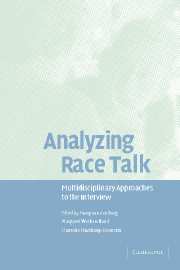Book contents
- Frontmatter
- Contents
- List of contributors
- Preface
- Acknowledgments
- Transcriptions symbols
- Introduction
- 1 Racism and the analysis of cultural resources in interviews
- 2 Analyzing racial discourse: the discursive psychology of mind–world relationships
- 3 Constructivist processes in discourse: a cognitive linguistics perspective
- 4 Institutional, professional, and lifeworld frames in interview talk
- 5 The uses of absurdity
- 6 Multiple voices in talking race: Pakeha reported speech in the discursive construction of the racial other
- 7 Contradictions in interview discourse
- 8 Racism, happiness, and ideology
- 9 The frame analysis of research interviews: social categorization and footing in interview discourse
- 10 Affiliation and detachment in interviewer answer receipts
- 11 Interviewer laughter as an unspecified request for clarification
- 12 Perspectives and frameworks in interviewers' queries
- Appendix: Interview transcripts
- Index
12 - Perspectives and frameworks in interviewers' queries
Published online by Cambridge University Press: 22 September 2009
- Frontmatter
- Contents
- List of contributors
- Preface
- Acknowledgments
- Transcriptions symbols
- Introduction
- 1 Racism and the analysis of cultural resources in interviews
- 2 Analyzing racial discourse: the discursive psychology of mind–world relationships
- 3 Constructivist processes in discourse: a cognitive linguistics perspective
- 4 Institutional, professional, and lifeworld frames in interview talk
- 5 The uses of absurdity
- 6 Multiple voices in talking race: Pakeha reported speech in the discursive construction of the racial other
- 7 Contradictions in interview discourse
- 8 Racism, happiness, and ideology
- 9 The frame analysis of research interviews: social categorization and footing in interview discourse
- 10 Affiliation and detachment in interviewer answer receipts
- 11 Interviewer laughter as an unspecified request for clarification
- 12 Perspectives and frameworks in interviewers' queries
- Appendix: Interview transcripts
- Index
Summary
It is futile to search for truly neutral questions. They don't exist. Every question carries presuppositions, so every question establishes a perspective. So for each question we must ask: Is the perspective taken really the one from which we want the respondent to answer? If the answer is yes – if we can justify the perspective – then we can also justify the question.
(Clark and Schober 1992: 30)One use of in-depth interviews is to determine the respondents' attitudes, beliefs, and/or opinions on controversial issues. Race is one such controversial issue. When an interviewer asks questions about racial issues (or controversial issues more generally), a fundamental organization comes into play: (1) asking about a racial issue reflects and implicates a position or perspective with respect to the controversy; and (2) an interviewer can construct a query that aligns to a greater or lesser extent with a position or perspective, or he or she may work to avoid aligning with a particular position or perspective.
When an interviewer asks about a particular racial matter, the interviewee might presume that the interviewer endorses the perspective implicated by the query. Likewise, when an interviewee responds to a query about a particular racial matter, the interviewer might presume that the interviewee endorses a perspective implicated by the response. The possibility of the interactants' making inferences about each other's perspective presents certain problems for both the interviewer and interviewee in terms of how to formulate and interpret queries and responses.
- Type
- Chapter
- Information
- Analyzing Race TalkMultidisciplinary Perspectives on the Research Interview, pp. 215 - 231Publisher: Cambridge University PressPrint publication year: 2004
- 2
- Cited by



